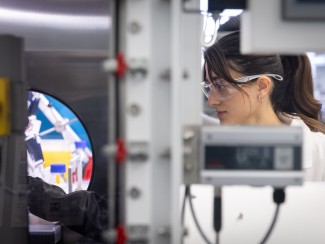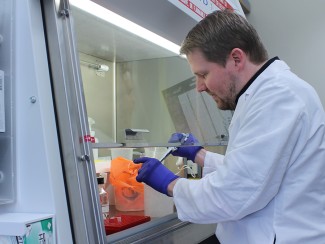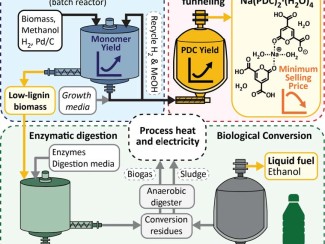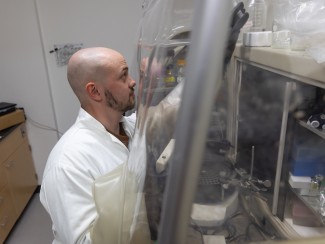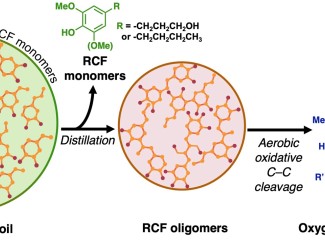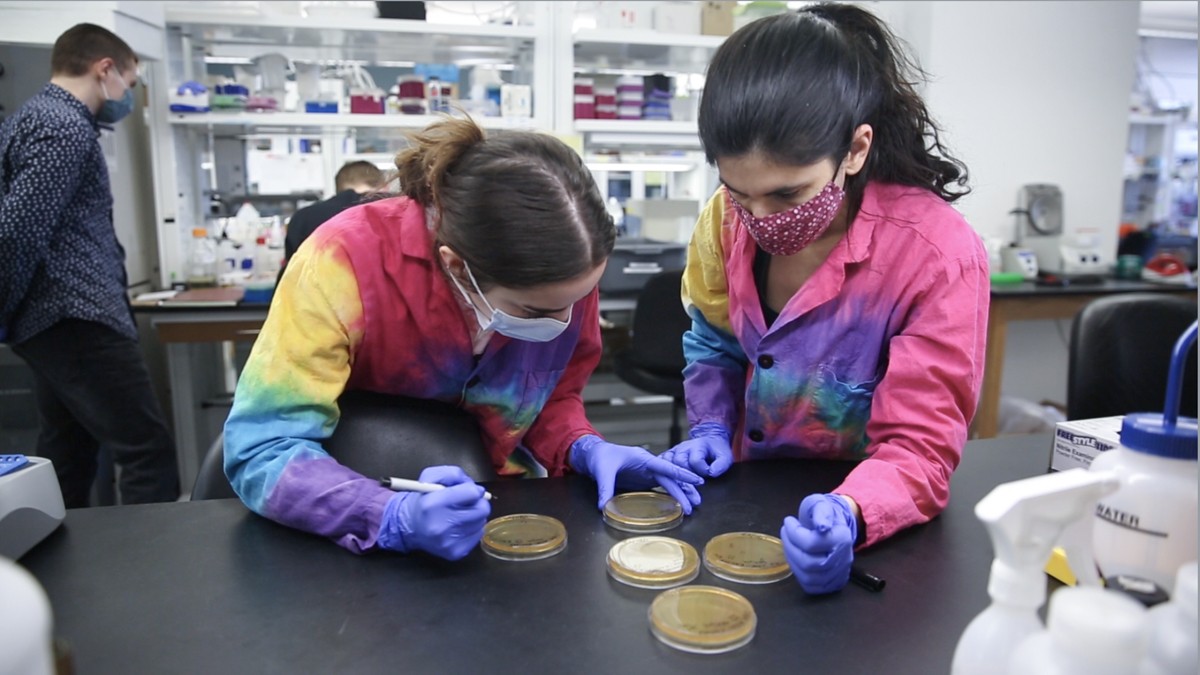
In this series, we learn more about what inspired our talented graduate students and postdoctoral researchers, what brought them to their field of study, and the questions that drive their work as part of the Wisconsin Energy Institute and Great Lakes Bioenergy Research Center.
The latest spotlight features Linda Horianopoulos, a postdoctoral researcher who studies the metabolic diversity of yeasts in the Hittinger Lab at the University of Wisconsin-Madison. Horianopoulos was born and raised in the small town of Kitimat, British Columbia. Read on to learn how an early interest in math and science led her to study at one of the top universities in Canada before eventually heading south for Madison.
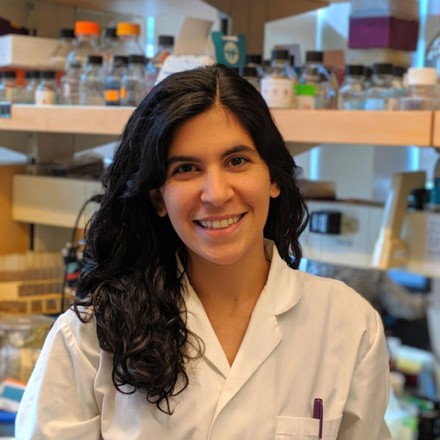
Could you walk me through what it means to study the metabolic diversity of yeasts?
Metabolism is really important to everything. It's how we break things down and build them … Yeast metabolism is really important to us as humans, and you could speculate that maybe it's even been important to our ability to survive because it gave us clean sources of things to drink, because they were fermented … The yeast that we usually think of, Saccharomyces cerevisiae, is used for bread, and wine, and beer. It's known to ferment really robustly; yeast will make ethanol even though they can make less energy overall from making that ethanol. If we look at all the other species, how much do they vary in that property, their ability to rapidly use up glucose and to ferment? I thought that that could have implications for biofuel production because if you have species that naturally are using glucose really, really quickly, then maybe they could make biofuels at a faster rate. And so I went about trying to test this in all these different yeast species. And I've developed a protocol, which measures how quickly the media gets acidified when you add glucose, which is kind of showing that things are made as a byproduct of this metabolism. And through doing that, we're able to identify some yeast species that have really rapid glucose consumption rates, and we're trying to figure out exactly why.
What are you working on currently?
I'm doing more molecular biology lately. I've been kind of systematically removing genes that we think might be important. We use some computational approaches to try to identify genes that might be important. And now I'm actually testing this out.
The way that I'm doing it, you replace the gene with a gene that makes it resistant to a drug. So you basically make a piece of DNA. There's a protocol called PCR, polymerase chain reaction, and basically, it's a way to amplify specific parts of DNA. So you amplify DNA from the species you are trying to mutate on either side of the gene of interest. Then in between those pieces, you insert another gene that will make it resistant to a drug. Finally you take that whole piece of DNA and put it into the original yeast species. And what you're hoping is that those pieces of DNA on either side of your gene will direct that piece of DNA to the right place. But to try to get those transformants, you then take all your cells and put them on a media with the drug so only those that have integrated that gene will be able to grow. And then you check to see if the original gene is still there. But that's the basics of how I mutate my yeast. Essentially, I'm replacing the gene of interest with a drug resistance marker.
{"preview_thumbnail":"/sites/default/files/styles/video_embed_wysiwyg_preview/public/video_thumbnails/R7yUJ8YHpUs.jpg?itok=WdZbIk37","video_url":"https://www.youtube.com/watch?v=R7yUJ8YHpUs","settings":{"responsive":1,"width":"854","height":"480","autoplay":0},"settings_summary":["Embedded Video (Responsive)."]}
What was like to grow up in Kitimat?
It's a small town of around 8,000 people on the northwest coast of British Columbia. It was a great place to grow up, lots of nature in that part of the world. But certainly, because it's small, you also have limited exposure to careers and particularly science. When I thought about possible careers, I was like, teacher, doctor, eye doctor. My scope was kind of limited in terms of who I was interacting with.
I went to undergrad at the University of Northern British Columbia, and that's in Prince George. That's a city of around 80,000 people. It was there that I was doing biology. Again, thinking optometry or something like that. And that's where I was first exposed to research and lab work, and I really liked it. And I remember one of my professors was also from a small village in northern British Columbia, and I was like “He could become a professor – maybe I could too; this is so cool.” All of my research was on the ecology in the local area. I studied mountain pine beetles. These infect like all of the pine trees, and so it was very placed-based research.
Were there any obstacles you faced as you pursued your education?
When you don't really have anyone that you know who's gotten into STEM (Science, Technology, Engineering and Mathematics), you really rely on mentors. I'm incredibly lucky and incredibly fortunate for that professor I worked with in undergrad. When it came time to go to grad school, he gave me really good advice about applying for scholarships, … scholarships I didn't even know existed that I would be eligible for. He advised me to go big, try to go somewhere where I was going to challenge myself and learn a lot and have access to a lot of resources. So I went to the biggest University in British Columbia. I was nervous about this, but I think that was really great advice He could have been like, “Oh, no, like, stay here and work with me for three more years” and get as much research out of me as possible … My parents were supportive, but they didn't know about this. My dad's a high school teacher … My mom was a preschool teacher. I come from a family of teachers, but neither of them really knew how research worked. … I feel really lucky that I had people to guide me through that.
What brought you to Madison and to the Hittinger Lab?
So it was actually during the pandemic. I thought, “Maybe now's a good time to start thinking about postdoc labs.” I saw the ad, and I thought it looked really cool because I was doing more molecular biology on a fungal pathogen. And I was really enjoying it. But I did kind of want to try working on non-pathogenic yeast. And when I saw this opportunity with the biofuel relevance, I thought that was really cool. Because I'm from a small industrial town, there is a lot of industrial development related to oil and gas pipelines. I just see how it can really divide a community, and aside from the obvious environmental impacts, there's a societal impact to this kind of stuff.
What was it like moving to a city you'd never visited?
I don't know what's in the water here, but everybody loves Madison. There was a postdoc in my old department, who had done his undergrad here, I talked to some other people who've been here. And everybody who had been in medicine had really good things to say. The first thing that shocked me was the humidity because I arrived at the end of August and I was like, “Whoa.” Everybody warned me about cold winters, nobody warned me about hot summers.
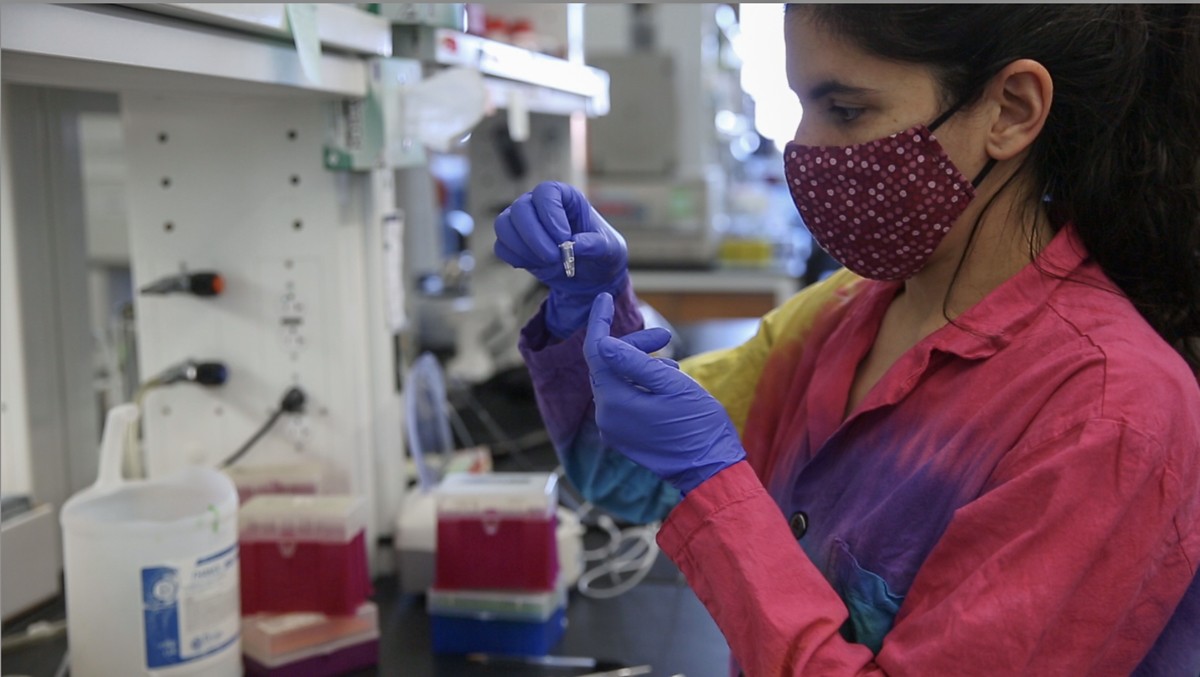
What was it like to switch from working with fungal pathogens to working with the molecular diversity of yeasts?
The things I learned in my PhD gave me a really good foundation to be able to do those things. It's been nice to kind of be able to do new things. Whenever you switch projects, it always takes time to get things going. And I was pretty lucky that when I came here, Chris also let me start my own projects. So that's super fun. In my old lab, everybody worked on one or two organisms, but they worked on different genes and proteins. And in the Hittinger Lab, people can be working on completely different organisms and genes and proteins. So I also learned a lot from my colleagues.
You’re very active on the Equity, Diversity and Community Committee here at the Wisconsin Energy Institute. How does that fit into your work?
Maybe this comes from being from a small town, but having a strong sense of community has always been really important to me. And I feel that way about where I work. We spend a lot of time at work … It's just very important that if I’m gonna be spending that much of my time somewhere, I want to feel like I'm part of something. And I want to feel like I can rely on the people I work with, both within my own lab and within the whole building. It's partly selfish that I want to feel like I'm part of something. But then also, I think it's good for everyone. And everybody deserves to have that … Not everybody has parents who are supportive of them moving to a different country and working in a lab and doing some crazy thing that they don't really understand. And so to have that community I think is really important for everyone. We're social beings.
How could your research impact people’s lives?
I think that we can optimize these kinds of species that I'm working with to be able to make biofuels at a faster rate from plant biomass. Then it can be an alternative to petroleum-based fuels. And of course, that will mitigate climate change. It does also kind of remove some of the injustice with climate issues. It's important to remember that rural communities often face more extreme hardships. If somebody's going to suffer because of a pipeline spill or something, it's really rare that it happens in New York. It's typically in rural places or remote places.
You say enjoy gardening and cooking. What’s your favorite dish to cook?
Lately it's been pizza. One of my lab mates actually gave me a cast iron pizza pan … I also like to joke that all week long I’m growing yeast in the lab and then on the weekend I grow more yeast at home to bake.

